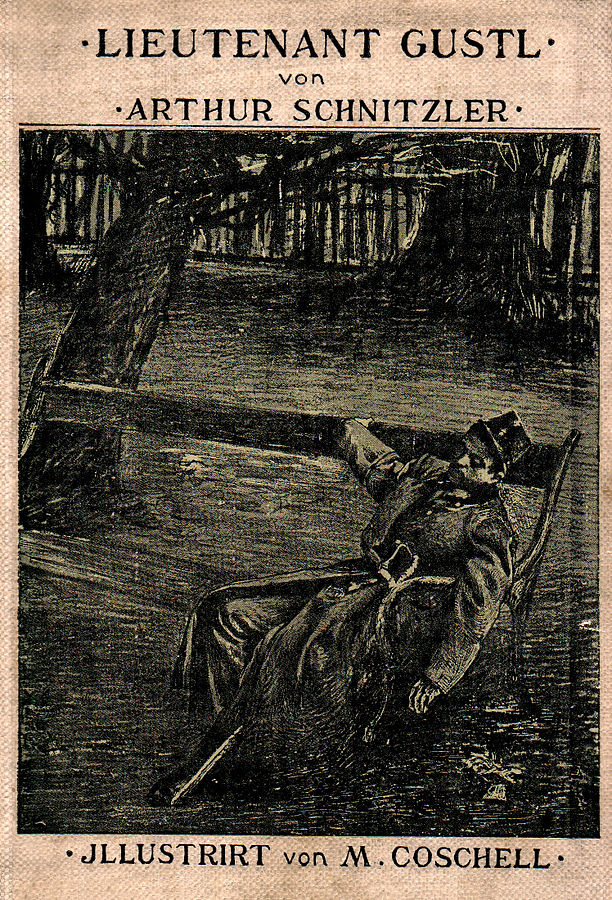
Cover of first edition of Schnitzler’s “Lieutenant Gustl”, public domain on Wikimedia Commons.
In Arts One this week we discussed two German short stories:
Heinrich von Kleist’s “The Earthquake in Chile” (I just discovered that there’s a 1970s film version)
Arthur Schnitzler’s “Lieutenant Gustl” (the translation linked to here is different than the one we read; this is the one we read, and the one I’m citing below)
We focused on Gustl yesterdy in class, and my brain and emotions just weren’t working as well yesterday as they usually do (last day of class issues? who knows), and I didn’t get to do some close reading of the beginning & end of the story as I had planned to do. So I thought I’d write a bit about that here on the blog.
Beginning
I noticed that one can get a great deal just from the very first page (first three paragraphs) of the story.
Impatience & concern with time
 The first thing we get from Gustl’s internal monologue is: “How long is this going to last, anyhow?” (107). We did discuss in class that a similar sort of sentiment is expressed on p. 141, when he asks himself, “How long will I keep sitting here?” (referring to sitting on the bench in the Prater). Right away we get a sense of his concerns about time, and even his impatience. He is at a concert at the beginning, and doesn’t seem to be enjoying himself and is impatient to leave.
The first thing we get from Gustl’s internal monologue is: “How long is this going to last, anyhow?” (107). We did discuss in class that a similar sort of sentiment is expressed on p. 141, when he asks himself, “How long will I keep sitting here?” (referring to sitting on the bench in the Prater). Right away we get a sense of his concerns about time, and even his impatience. He is at a concert at the beginning, and doesn’t seem to be enjoying himself and is impatient to leave.
There are many other references to his impatience in the text, including in the second paragraph of the story, which starts with him saying to himself: “Well, then, patience, patience! Even oratorios come to an end” (107). The most obvious example of his impatience is when he gets into the altercation with the baker. He is clearly being impatient trying to get his coat on the bottom of p. 117, and then the baker says to him, “Patience, patience!” (119). The baker also tells Gustl, “You’re not going to miss anything!” Gustl says something similar to himself, later, when he’s out wandering on the street: “slower, slower, Gustl, you aren’t missing out on anything, you have nothing left to do–nothing, absolutely nothing left!” (133). He also asks at one point “Why am I dashing along like this? None of my trouble is running away …'” (125). There are more examples of places that show him being impatient, but these are enough for now.
“I must look at my watch” is the second sentence of the story (107) (compare to the same statement on 143, when he wakes up in the park and wonders what time it is). He is frequently wondering what time it is in the story, along with being impatient. In the first paragraph he notes that it is “Only a quarter to ten?” (107). He hears the clock strike 11 after he leaves the theatre (125), thinks it must be past midnight in the park (141), wakes up at 3 in the park (145), hears a clock strike 3:30 when he’s walking back from the park (147), and notes that it’s 5:45am when he is getting close to his coffeehouse (157). He also decides to set himself the time of 7am to shoot himself and then later thinks, well, he could put it off another hour or so.
I asked in class: what should we make of his concern with time and his impatience? What might be the significance of these in the context of the story? He might be impatient at the concert because he is bored and wants to get out of there. But he also finds himself rushing when he’s out on the street. There might be something going on here in terms of him rushing ever forward only to be heading to his own death–so some kind of irony? I also wondered if it might signify that he is spending so much time looking outward, worrying about how he looks in the eyes of others, going to the places he is supposed to go in order to be seen, that he doesn’t slow down and self-reflect. But I don’t feel really strongly about that interpretation.
I think I still don’t have a good sense of the significance of his impatience.
Being out of place
Back to the first paragraph: after noting that he wants to look at his watch, Gustl says “probably not polite as such a serious concert” (107). This starts to bring up an idea that maybe Gustl doesn’t belong in the particular milieu. He doesn’t really know for sure how to act. We can see this also later in the paragraph when he wonders what kind of song it is and has to look at the program: “Yes, that is: oratorio. I thought it was a Mass.” I remember hearing last year when we discussed this book that Gustl is being presented as if he doesn’t really belong in this space. He doesn’t have the right knowledge to really understand this cultural event. He was given a ticket; he didn’t really choose to go because he wanted to attend this kind of concert. He even tells himself in the third paragraph of the story: “By the way, they sing very nicely. It’s very edifying–I’m sure!,” suggesting that he doesn’t really know if it’s edifying but figures it must be. Still, he doesn’t really get how it is so, if it is.
Gustl feeling out of place continues in the story, after the altercation with the baker. Gustl can’t believe what the baker did–he keeps asking whether or not it really happened, and as it is happening he can’t understand what the baker says (119)–because it doesn’t fit with his understand of social relations in his culture. Bakers just don’t do that, and then when it happened Gustl had no ritual to fall back on, no clear way to deal with the situation. When he goes out into the street he is figuratively lost, wondering where to go and what to do: “Where have I got to? What am I doing out on the street? –Yes, but where should I head?” (123). He wanders aimlessly, not really knowing where he is going until he just finds himself in certain places unexpectedly. At one point he even notes that he is sitting on a bench in the Prater “homeless” (143).
Worrying about what others think
In the third sentence of the story Gustl worries whether someone will see him looking at his watch: “But who’s to see it? If someone sees it, then he’s paying just as little attention as I am, and I don’t have to bother on his account” (107). He’s concerned how he looks to others and what they think of him, but if others are doing the “wrong” things too by not watching the concert and looking at him, then he doesn’t need to worry about them. We get a great deal of evidence of Gustl being concerned what others do and will think of him throughout the story; I don’t need to enumerate them here as they’re quite easy to find!
Social manners, ritual, honour
In the second paragraph of the story, Gustl talks about how he got the ticket to the concert from Kopetsky, and since he is bored he thinks he should have given the ticket to someone else who would have enjoyed it more. “But then Kopetsky would have been insulted” (107). Here is an example of social manners he feels he needs to hold up–he is concerned about social roles and expectations. That’s also the reason why he doesn’t want others to see him looking at his watch, looking bored, at the concert–he worries that that isn’t appropriate in this social situation.
At the end of the third paragraph of the story, Gustl’s thoughts take on a tone of foreshadowing: “Yes, the day after tomorrow I may be dead and cold! Oh, nonsense, I don’t believe that myself!” (107). He is ostensibly talking about the duel with the doctor scheduled for the next day, but it could also foreshadow his plans later in the story to kill himself. Then the last two sentences of the third paragraph refers to the duel directly: “Just wait, Doctor, you’re going to lose your taste for making such remarks! I’m going to slice off the tip of your nose …” (107). So here we’re introduced to the social ritual of the duel.
These things are significant because the social manners and rituals that Gustl is used to are broken in when he gets into a scuffle with the baker. Before this, the story is setting Gustl up as someone who plays by the social rules, at least outwardly (while inwardly, as we discussed, he thinks all kinds of things that may or may not fit into the social rules and practices at the time). When the baker doesn’t play along, Gustl is left without a playbook, not knowing what to do.
Ending
I also find the very end interesting to read closely, along with the beginning. I’m just looking at the last paragraph here.
Time and being out of place
Gustl is back to paying careful attention to time. He schedules out the rest of his day: “In a quarter of an hour I’ll go over to the barracks and get a cold rubdown from Johann … half past seven is rifle drill, and half past nine is formation” (163). He then refers to the duel at 4 that day. He now has plans again, he can schedule his day, he knows what he is doing and where he is going, as compared to being lost and out of place the night before.
By the time the story ends he is back in “his” coffeehouse, with the waiter he knows, and he comes back to himself and his plans for his life. He is full of confidence, whereas earlier he had started to wonder where he was, where he was going, and doubting himself (147, 151). By the end he says he’s going to insist that Steffi make herself available to him that evening, and he is certain he is going to win in his duel against the doctor–whereas earlier he was a little unsure (he thinks he might die in the duel (107, 127) and states that he is “unqualified to give satisfaction” in the duel because of what happened with the baker (125)).
So one might say that he starts the story in a place where he’s somewhat out of place (the concert) and then feels lost & homeless in the streets, but finally comes “home” to his coffee house by the end and feels more confident. He’s back in his usual military life with its usual time-table. Everything make sense again to him.
 And as we discussed in class, he hasn’t changed much, if at all, by the end. His life goes back to the same things: Steffi, the duel with the doctor. Gustl even says on the last page that “No one knows a thing, and nothing has happened!” (163). The first part is true, but not the second–something has happened, and Gustl earlier suggests that it should matter even if no one else knows. But now that no one else knows or can know, for Gustl it’s as if nothing even happened at all. He has completely left it behind, and the event has left no mark on his life.
And as we discussed in class, he hasn’t changed much, if at all, by the end. His life goes back to the same things: Steffi, the duel with the doctor. Gustl even says on the last page that “No one knows a thing, and nothing has happened!” (163). The first part is true, but not the second–something has happened, and Gustl earlier suggests that it should matter even if no one else knows. But now that no one else knows or can know, for Gustl it’s as if nothing even happened at all. He has completely left it behind, and the event has left no mark on his life.
I don’t often do close readings of portions of texts, but I always find it valuable when I do, so I want to make sure to do more of these in class in the future!
